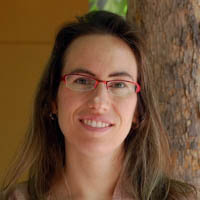Campus News
Computer scientist Lindsey Kuper wins NSF CAREER award
Lindsey Kuper, assistant professor of computer science and engineering at the University of California, Santa Cruz, has won a Faculty Early Career Development (CAREER) Award from the National Science Foundation (NSF) to fund her lab’s study of distributed systems.

Lindsey Kuper, assistant professor of computer science and engineering at the University of California, Santa Cruz, has won a Faculty Early Career Development (CAREER) Award from the National Science Foundation (NSF) to fund her lab’s study of distributed systems.
Many people rely on distributed systems, networks of one or more computers that communicate with each other, in their daily work and personal lives while using Zoom, sharing files, and playing online games. These ubiquitous systems have a constant possibility of failure from problems such as internet or hardware errors, and are notoriously difficult to program – an issue that Kuper and her students will tackle with the funds from this grant.
The grant will enable Kuper to meld her interests and background across computer science areas such as programming languages (PL) and software verification to improve and build confidence in distributed systems. Her lab will do this by using and improving on tools based on refinement types, powerful and relatively easy-to-use approaches to ensure a program works correctly before the program is run.
“I’m trying to apply PL ideas to reasoning about and building better distributed systems,” Kuper said. “In the PL philosophy we try to reason about the way software behaves in a rigorous way, and in a very general way. I’m taking that way of thinking and applying it to the hard problems of building distributed systems.”
Kuper hopes to use this funding to create more approachable ways for newer students to study distributed systems, which are deeply relevant in computer science careers but are often not taught in undergraduate and even graduate level courses.
Undergraduate students in her lab will create educational materials such as videos and zines about distributed systems. These projects are meant to deepen the students’ understanding but also involve younger students in informal research conversations and make the area of study less intimidating for others.
“In addition to the intrinsic value of this work – building confidence in complex systems – this project emphasizes the importance of communicating these concepts, and provides undergraduates with the opportunity to develop creative, open-source materials,” said Alex Wolf, dean of the Baskin School of Engineering.